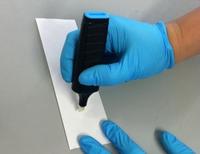-
Growing scrutiny of police use of Stingray surveillance technology
IMSI-catcher (International Mobile Subscriber Identity), aka Stingray, is a surveillance technology which simulates cell phone towers in order to intercept mobile phone calls and text messages. Privacy advocates have scrutinized the use of Stingrays in U.S. cities because, when the device tracks a suspect’s cell phone, it also gathers information about the phones of bystanders within the target range. Additionally, police use Stingrays without properly identifying the technology when requesting search warrants has raised concerns.
-
-
Egypt’s military involvement in the anti-Islamist campaign in Libya deepens
Two days ago, on Wednesday, Egypt has escalated its involvement in the battle against Libyan Islamists, as Egyptian warplanes conducted a series of attacks on Islamist militias’ positions in the eastern city of Benghazi. In late August, Egyptian and UAE warplanes attacked Islamist positions in and around Tripoli. Egypt’s growing direct military involvement in Libya has turned that country into yet another theater of a proxy war for broader regional battles, with Qatar and Turkey supporting the extremist Islamist militias while Egypt, Saudi Arabia, and the United Arab Emirates backing the militias’ opponents. The growing Egyptian involvement is an indication that after two years of introspection and confusion, the moderate forces in the Arab world have begun to assert themselves in an effort to gain a measure of control over post-Arab Spring developments in the region.
-
-
Public safety network failed to involve important constituencies in development phase
On 22 February 2012, Congress passed the legislation to create the First Responder Network Authority (FirstNet), an agency tasked with creating a nationwide wireless broadband network for public safety and emergency response officials. Currently, the nation’s 5.4 million first responders rely on commercial carriers to communicate and share critical information during emergencies. Analysts say that a failure to incorporate the public safety sector into the development phase of FirstNet set the new agency on a wrong path in its early days.
-
-
Animals have built-in seismic early-warning mechanism: Scientists
Unusual animal behaviors (UABs) have been observed before large natural disasters including earthquakes, but these animals’ “early warning” mechanisms have not been scientifically identified. A recent study in Japan investigated the behaviors of cats and dogs, and changes in dairy milk production, before the magnitude-9.0 earthquake that struck the island nation on 11 March 2011.
-
-
Minnesota law enforcement helps Somali community fight radicalization, terror recruiting

For years, Minnesota’s Somali community has been battling the recruitment of young men and women into militant groups like al-Shabaab and the Islamic State (ISIS). Several community and religious leaders have helped form youth groups and held public discussions about the radicalization of Somalis in America. Law enforcement agencies are also playing their part. Andy Luger, U.S. Attorney for the District of Minnesota, is working with members of the local Somali community to better understand its concerns and how to help the community fight extremism.
-
-
U.S. military must be ready for climate change: Hagel
Climate change is a threat multiplier, and the U.S. Defense Department is taking steps to incorporate this issue into all planning, Defense Secretary Chuck Hagel said in Peru Monday. Climate change has the potential to exacerbate many of the challenges the world already confronts, from the spread of infectious diseases to spurring armed conflicts, Hagel said at the Conference of the Defense Ministers of the Americas. Hagel announced a Defense Department Climate Change Adaptation Roadmap during his speech. The roadmap is based on science, he said, and describes the effects of climate change on DoD’s missions and responsibilities.
-
-
Building a better lie detector
The Intelligence Advanced Research Projects Activity (IARPA), within the Office of the Director of National Intelligence (ODNI), announced the other day the winner of its first public challenge contest, Investigating Novel Statistical Techniques to Identify Neurophysiological Correlates of Trustworthiness (INSTINCT). The winning solution, JEDI MIND — Joint Estimation of Deception Intent via Multisource Integration of Neuropsychological Discriminators — uses a combination of innovative statistical techniques to improve predictions approximately 15 percent over the baseline analysis.
-
-
Los Angeles County to cooperate with ICE on detaining undocumented immigrants

The Los Angeles County Board of Supervisorsvoted Tuesday to extend 287(g), a program which allows federal immigration agents to train county jail employees to investigate whether certain inmates convicted of serious crimes are in the country illegally. Inmates confirmed as undocumented immigrants are then transferred to Immigration and Customs Enforcement(ICE) detention centers after serving their sentence.Aroud the country, at least 225 law enforcement agencies have decided to refuse hold requests from ICE.
-
-
California needs $54 million to deploy ShakeAlert earthquake warning system
Officials in California need $54 million fully to implement the ShakeAlert earthquake warning system, according to a scientist with the U.S. Geological Survey (USGS).ShakeAlert detects earthquakes using the California Integrated Seismic Network of roughly 400 ground motion sensors which identify primary waves (P-waves) as they move through the Earth at almost twice the speed of the earthquakes’ destructive S-waves, which shake the ground.When an earthquake is detected, ShakeAlert informs emergency management officials of the quake’s epicenter, and a computer-generated voice counts the remaining time before shaking occurs.
-
-
A crime-fighting “magic” marker pen picks up hidden fingerprints

A crime-fighting “magic” marker pen that can identify the hidden properties of receipts containing fingerprint deposits within a matter of seconds will be demonstrated at the Knowledge Transfer Network’s (KTN) Applications of Forensic Science Research and Development Technology Showcase 2014 event today (8 October) in London.
-
-
More law enforcement agencies refuse to hold undocumented inmates for ICE
Recent court rulings have emboldened roughly 225 law enforcement agencies across the country to refuse requests from Immigration and Customs Enforcement(ICE) officials to hold undocumented inmates past their release dates so federal authorities can have time to deport them. Until recently, inmates suspected of being in the country illegally were held for an additional forty-eight hours until ICE agents arrived. Some municipalities began limiting the number of holds a few years ago, but several counties and cities have begun to ignore the requests all together after recent court rulings confirmed that the immigration holds are not mandatory.
-
-
U.S. Navy unveils autonomous swarmboats to “swarm” hostile vessels
As autonomy and unmanned systems grow in importance for naval operations, officials at the Office of Naval Research (ONR) announced the other day a technological breakthrough that will allow any unmanned surface vehicle (USV) to not only protect Navy ships, but also, for the first time, autonomously “swarm” offensively on hostile vessels. The first-of-its-kind technology — successfully demonstrated over two weeks in August on the James River in Virginia — allows unmanned Navy vessels to overwhelm an adversary.
-
-
Mopping up toxic fire-fighting chemicals

Australian scientists have come up with the solution to a world-wide pollution problem — how to mop up the toxic residues left after the use of special foams to fight fires. The technology uses a modified clay to soak up potential cancer-causing substances in the foam used by fire fighters, defense facilities, and airports worldwide to suppress fires.
-
-
U.S. Cyber Command plans to recruit 6,000 cyber professionals, as U.S. mulls offensive cyber strategy
Last Wednesday, House Intelligence Committee Chairman Mike Rogers (R- Michigan) told reporters that he would like to see the United States adopt a more offensive strategy in cyberspace, but added that the Pentagon, intelligence agencies, and law enforcement must first develop protocols for offensive cyber measures.The following day, U.S. Cyber Command (USCYBERCOM) announced plans to recruit 6,000 cyber professionals and create 133 teams across the country to support the Pentagon in defending the nation’s cyber infrastructure.
-
-
The Big One will have frightening consequences for Los Angeles: Scientists
Scientists cannot accurately predict when California’s next massive earthquake – or, the Big One – will strike, but they can predict the effects, and it is frightening. Scientists with the U.S. Geological Survey (USGS) say these effects will include powerless rescue services, widespread fire damage, and no fresh water for months on end. The 1994 Northridge Earthquake was the region’s the last mega-quake, but scientists say that “When we have the San Andreas earthquake, that earth fault will probably be about 20 to 30 times larger than the fault that produced the Northridge earthquake [which still resulted in $20 Billion in damages].”
-
More headlines
The long view
Factories First: Winning the Drone War Before It Starts
Wars are won by factories before they are won on the battlefield,Martin C. Feldmann writes, noting that the United States lacks the manufacturing depth for the coming drone age. Rectifying this situation “will take far more than procurement tweaks,” Feldmann writes. “It demands a national-level, wartime-scale industrial mobilization.”
How Male Grievance Fuels Radicalization and Extremist Violence
Social extremism is evolving in reach and form. While traditional racial supremacy ideologies remain, contemporary movements are now often fueled by something more personal and emotionally resonant: male grievance.
The Surprising Reasons Floods and Other Disasters Are Deadlier at Night
It’s not just that it’s dark and people are asleep. Urban sprawl, confirmation bias, and other factors can play a role.
Why Flash Flood Warnings Will Continue to Go Unheeded
Experts say local education and community support are key to conveying risk.
